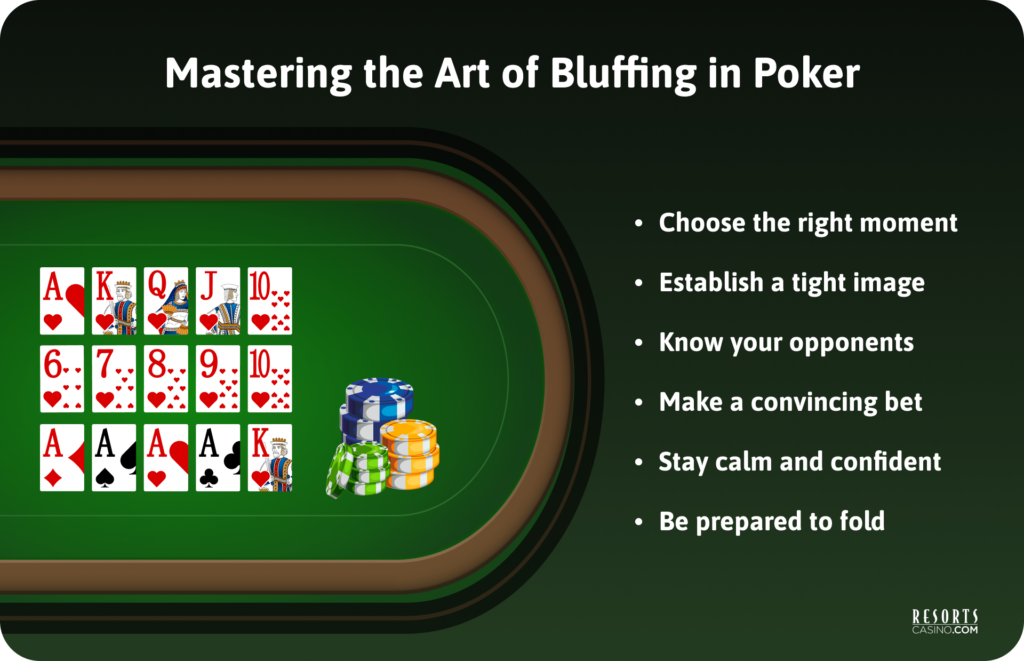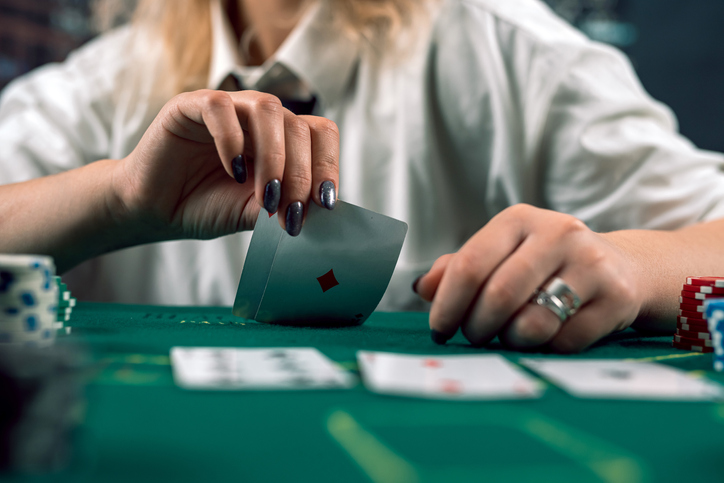Mastering the art of bluffing in poker
As a beginner in poker, you may wonder whether it is worth your while to learn how to bluff. Perhaps you feel that you understand the game well enough to win a hand or two every so often.
It is tempting to think that so long as you know the rules of poker, you don’t need to learn about bluffs. This isn’t true. Experienced poker players will tell you that knowing the game is only half the strategy.
The other half involves understanding the fundamentals of bluffing, learning some essential bluffing strategies, reading your opponents, and as you get better and better, learning some advanced bluffing techniques.
You may wonder why you should learn anything about bluffing. How would it help your poker game?
Bluffing is all about being able to tell what is happening at the table. The better you are at reading your opponents and putting poker bluffing strategies into action, the higher the odds of winning most of the games you play.
Some expert poker players will tell you that there are certain people they would never play against because they are so good at reading faces, cues and ticks that they almost always have an edge over everyone else on the table.
If you want to become one of these people, keep reading to learn about the fundamentals of bluffing and a few strategies that you can start using right away.
The fundamentals of bluffing
Before we get into the fundamentals of bluffing, it is important to first define what bluffing is.
Simply put, it is when a poker player bets or raises in an attempt to make the other players at the table fold, leaving the jackpot for him to win.
Ideally, a player can bluff at any stage of a poker game, but the best players keep an eye on things so that they can do it at the most opportune moment when they know that at least one other player is likely to fold.
It is all about making other players lose hope and walk away from the current hand, leaving it for you to win.
Now, let’s look at some of the fundamentals of this essential part of any poker game.

Limit your bluffs
As a beginner, you may assume that the poker bluff is a big part of any poker game. It isn’t, and it should only be used when necessary.
There are two reasons for this. The first is that if you bluff all the time, the other players will be on to you, and you will no longer be able to make them step away from the jackpot.
The other reason why you shouldn’t bluff all the time is you must be sure that you can get the other players to fold. If you try to bluff and it doesn’t work, it leaves you in an awkward position and may cause you to lose the hand.
Don’t forget the other players at the table also have a few tricks up their sleeves, and they may get you to do something that you hadn’t planned on.
Beginners should be wary about when they bluff
As a beginner, you may think that a quick read of this guide will set you on your way to winning a big jackpot, so you bet big and then try to get the other players to lay down their cards.
However, it’s important to remember that they know the game better than you, and these more experienced players can cause you to lose big if they can see through your bluff.
If you must bluff as a beginner, set your eye on low and medium stakes so that you don’t lose too much.
It is best to try and bluff strong players
You may assume that it is easier to get weak players to keep betting on their hand, but in fact, the opposite is true.
New players rarely pay attention to what cards the others may be holding, and they are likely to go on betting based on what they are holding for as long as possible.
More experienced players are always thinking about what cards the other players could be holding, and so they are easier to bluff against.
Use the pre-bluff pre-flop
If you are in the middle of the game and the other players have left you behind with significant margins, you can turn things in your favor by using the pre-flop.
This is a psychological trick, and if it works, it can give you a huge advantage.
Just when the other players think you ought to fold, take a long look at your cards and then make it look like you are seriously thinking about what to do.
When you have their attention, raise the ante by a substantial amount and watch the reactions of the others around the table.
Those who don’t flinch are holding good cards and think they have a chance to win. Those who suddenly look crestfallen are holding a bad hand, and you can get them to give up.
You can then reassess your strategy about those who are still willing to play on.
If a bluff doesn’t work
If you try something and your opponents don’t fold, you shouldn’t stay in the game. They know that you have a bad hand, and sooner or later, they will take advantage of it to make sure you lose big.
As soon as you realize no one is taking you seriously enough to fold, you should fold yourself and let the other players finish the game.
Focus on one player
As a beginner, it is easier to get one or two people to fold rather than trying to get everyone to fold at the same time. It is almost impossible to get everyone at the table to give up their hands.
Choose a player that you know you can bring down and observe him. If he doesn’t look too sure of the cards he is holding, your bluff should be targeted at him.
Always remember that the more players there are at a table, the higher the odds of someone calling your bluff.
Always stay calm
The most successful poker players do not ever give away their emotions. Even when they win, they make sure to stay calm and not give away their real feelings.
When they are in trouble, they maintain their cool, making sure others cannot take advantage of their weakness.
If you find it difficult to remain calm, you should try as much as possible to be a wallflower. Stay as quiet as possible so that the other players don’t pay you much attention.
Keep your tells in check
This is one that many poker players have a problem with. Fundamentally, bluffing is lying, and many people cannot lie with a straight face. They have a tic that gives them away sooner or later.
If you want to be any good at poker bluffing, it’s important to keep your tics in check. Find ways to deal with them so that your opponents cannot tell whether you’re bluffing or telling the truth.
Use different bluffs
Poker players are smart; they watch and learn, and whatever bluffs you use this time may not work next time. It is a good idea to use different tells for different games, especially if you are playing against the same opponents.
Use quick bluffs for low-risk, low-return hands
Don’t expend a lot of energy on bluffs that are likely to win you only a small jackpot, but you can take advantage when the stakes are small and ever
However, always remember that you should bluff sparingly. If you do it too often, the other players will anticipate your moves and may very well use them against you.
Spare the best for the big jackpot
If you’re determined to try and win the biggest hand of the night, you should save your poker bluff until most of your opponents are all in.
When there are just two of you left, go all in and then watch your opponent. If he feels that things are too rich for him, he will fold, and you get to walk away with the whole pot.
If he doesn’t, you lose, but you have learned something that you can use the next time you’re facing a formidable opponent.
Use stone-cold bluffs when you are cornered
You are coming to the end of the game, you have nothing of value in your hands and you know that if you don’t do something soon, you will lose the game.
You can take a chance and make what is called a pure bluff. Also called a total bluff or a naked bluff, it is the sort that a player makes when they have absolutely nothing to lose. If you don’t make that bluff, you lose the game anyway.
Essential bluffing strategies
We have already discussed some of these, but they are worth going into in a little more detail so that you know which ones you can use in your next poker game.
Semi-bluffing
This bluff is based on two ideas: that there is a good chance the bluff will work right away, and that it will improve the player’s hand and give him a chance to win the game.
Continuation betting
This is a bet that is made by the player who made the pre-flop bet. It doesn’t matter that the pre-flop didn’t give you a better hand. You can still improve your odds of winning because in most cases, the other player will also not make a pair on the flop.
Double-barrel bluffing
This is a wager that is made by the same player who placed a bet on the flop. Imagine you bet on a flop and your opponent bets, and then you bet again.
That is what is called a double-barrel, and it is an important strategy because it grows the size of the pot and forces players to think about their actions carefully.
Reading your opponents
Reading your opponents is vital because it is how you determine whether or not you will make a bluff.
It is not a hard-and-fast science because each person at the table is unique, but you can tell what is going on with their hand and in their minds by carefully observing how they react to certain situations.
Some players change their voices when they have a good hand because they are excited. Others freeze because they don’t want others around the table to know that they have good cards.
You will become a better reader of other players over time, so it shouldn’t stress you out when you are just beginning. Get a good understanding of the game so that others don’t take advantage of you.
Advanced bluffing techniques
Certain techniques are used by professional poker players, and they shouldn’t be attempted by beginners unless they are sure that they can carry the play through.
These include stealing the blinds, the light three-bet and the four-bet light. Some expert poker players also use the bluff raise, the three-bet flop with big draws, float the flop, then bet turn and the bluff raise.
These will take time to master, and they may or may not help your poker game. At the end of the day, whether these techniques work is determined by how good the other players at the table are.
If you’re looking for live demonstrations of all these techniques, we suggest visiting Resorts Casino. In the Resorts Live section, you will find some of New Jersey’s top influencers walking players through different poker strategies. You can watch them playing live, and they will answer whatever questions you have about different bluffing strategies.




